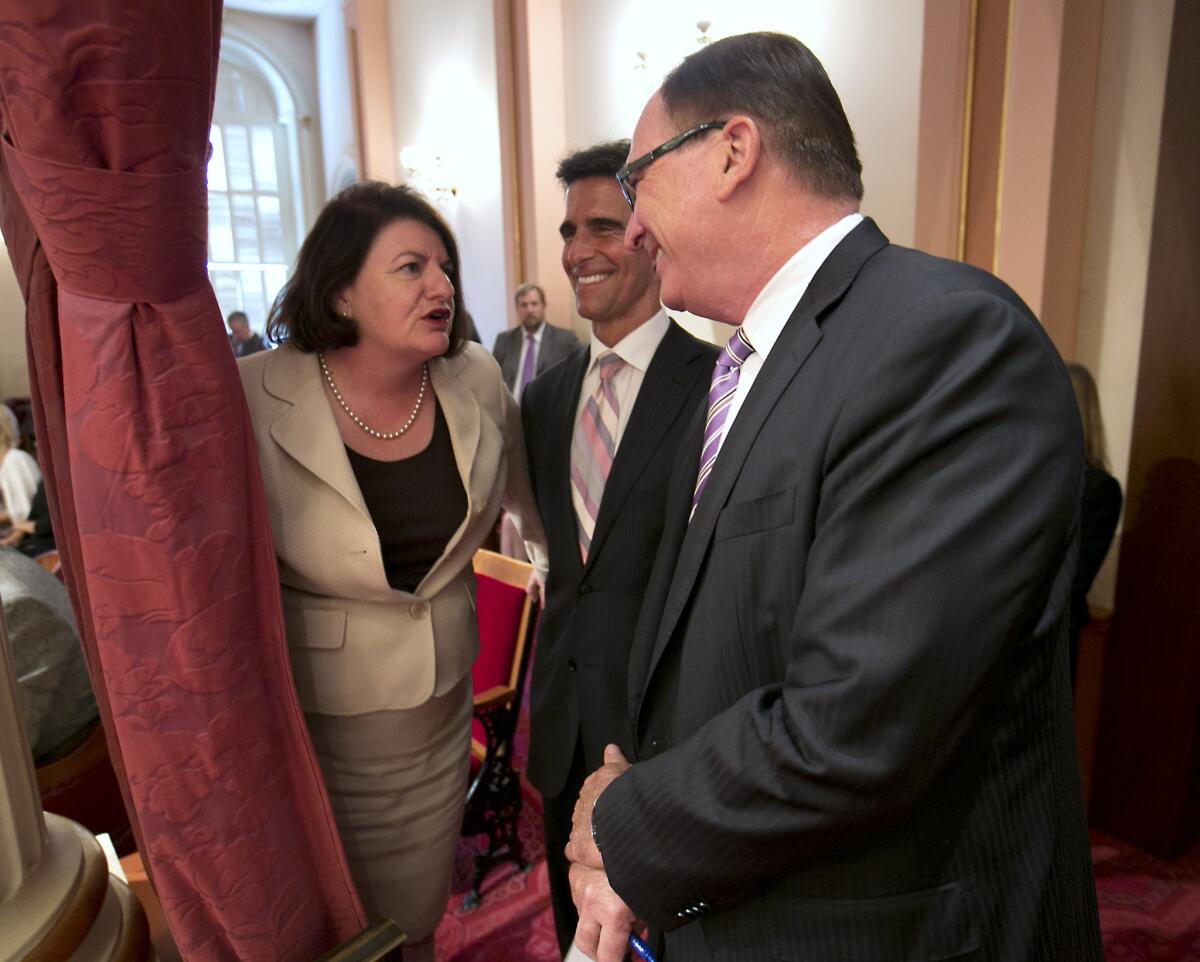Toni Atkins on her first budget as Speaker: ‘I feel pretty good’

- Share via
Reporting from Sacramento — Speaker Toni Atkins (D-San Diego), culminating her first budget negotiation as the top Assembly Democrat, touted increased education spending in the newly-passed $156.4-billion spending plan, but said she was disappointed that the plan did not increase payments to doctors participating in Medi-Cal.
“I feel pretty good about tonight,” Atkins told reporters Sunday evening after the Assembly had completed a series of budget votes. “We ensured there would be fiscal stability -- that was a key going into this whole budget process. And frankly, we were also able to expand opportunity and to look at some programs that are really important to Californians.”
Atkins said the negotiation process was “incredibly tame and fairly smooth compared to any other year.”
Republicans and even some Democrats had grumbled about a number of last-minute policy proposals cropping up in the final days of negotiations. One particular flash point was a school finance proposal that would limit the amount of money local school districts could keep in their reserves.
The proposal was backed by teachers unions, but faced criticism from school administrators. Republicans accused the Democrats of catering to the California Teachers Assn., a powerful backer of the Democratic party.
“Certainly CTA wanted it. They wanted it for a reason. And the reason is that money should not be stockpiled when there is need in classrooms,” Atkins said.
Atkins said the proposal reflects the intent of Proposition 30, the temporary tax increase passed in 2012. That measure, she said “was about promising the voters and the citizens of California that we would put the money in the classrooms, into students and into teachers.”
“This ensures that that is done in a responsible way,” she added. “So whether we’re responding to CTA or we’re staying true to Proposition 30 -- I think we’re doing the latter.”
The budget deal wasn’t devoid of disappointments, Atkins said. She would’ve liked to see a higher increase in the CalWorks welfare grants and further increased money for the state’s courts.
And she said she was also dissatisfied that the state will not be increasing the rates paid to providers who participate in the Medi-Cal program. The state’s low reimbursement rates -- among the lowest in the nation -- are bemoaned by lawmakers of both parties, and Atkins said the issue is “near and dear to [her] heart” as someone that had run community clinics.
Raising the reimbursement rates will remain high on the agenda, she said.
“The Senate wants to do this, the Assembly wants to do this and the governor understands we need to. So we are working as of tomorrow to figure out how soon we can do this,” she said.
Despite that disappointment, Atkins said she overall she felt pleased with the spending plan, and hoped “Californians will too.”
“I hope they will see how hard we worked to increase educational funding, to deal with realignment in ways that make sense,” she added. “All those are good things.”
Follow @melmason for more on California government and politics.
More to Read
Sign up for Essential California
The most important California stories and recommendations in your inbox every morning.
You may occasionally receive promotional content from the Los Angeles Times.














![Vista, California-Apri 2, 2025-Hours after undergoing dental surgery a 9-year-old girl was found unresponsive in her home, officials are investigating what caused her death. On March 18, Silvanna Moreno was placed under anesthesia for a dental surgery at Dreamtime Dentistry, a dental facility that "strive[s] to be the premier office for sedation dentistry in Vitsa, CA. (Google Maps)](https://ca-times.brightspotcdn.com/dims4/default/07a58b2/2147483647/strip/true/crop/2016x1344+29+0/resize/840x560!/quality/75/?url=https%3A%2F%2Fcalifornia-times-brightspot.s3.amazonaws.com%2F78%2Ffd%2F9bbf9b62489fa209f9c67df2e472%2Fla-me-dreamtime-dentist-01.jpg)